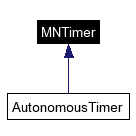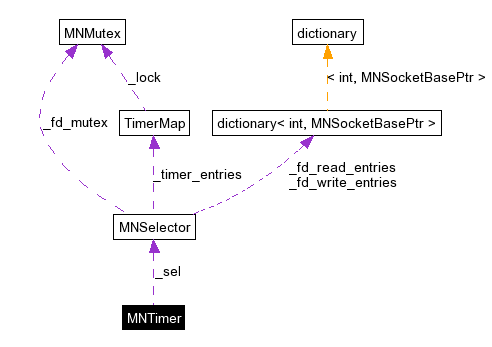
#include <MNTimer.h>
Inheritance diagram for MNTimer:


Public Member Functions | |
| MNTimer (MNSelector &selector, const char *debug_creator_string) | |
| virtual | ~MNTimer () |
| void | insert_abs_timer (TimerCallBase *timerptr, const struct timeval &timeout, bool inCallback, const char *owner) |
| void | reschedule_abs_timer (TimerCallBase *timerptr, const struct timeval &timeout, bool inCallback, const char *owner) |
| void | insert_rel_timer (TimerCallBase *timerptr, const struct timeval &timeout, bool inCallback, const char *owner) |
| void | reschedule_rel_timer (TimerCallBase *timerptr, const struct timeval &timeout, bool inCallback, const char *owner) |
| void | insert_periodic_timer (TimerCallBase *timerptr, const struct timeval &timeout, bool inCallback, const char *owner) |
| void | cancel_timer (TimerCallBase *timerptr) |
| void | cancel_all_timer () |
| void | wait_usec (long time_) |
| virtual void | start_timer () |
| dummy function - allows transparent use of AutonomousTimers | |
| virtual void | terminate_timer () |
| dummy function - allows transparent use of AutonomousTimers | |
| MNSelector & | getSelector () |
Static Public Attributes | |
| const bool | InCallback = true |
| const bool | NotInCallback = false |
|
||||||||||||
|
Constructor. |
|
|
Destructor. |
|
|
Cancels all active timers. |
|
|
Removes the timer uniquely identified by the parameter fd from the list of waiting timers, or if necessary, cancels this timer and selects a new front of the waiting timers' queue.
|
|
|
Get this selector for re-use. This may allow to use just one timer and to have several other timers run in the same thread. |
|
||||||||||||||||||||
|
Inserts a timer with an absolute timeout time. The time must be provided in UCT for the time of the next timeout. The registered timecall is deleted from this timer after one execution of the callback. No other calls are generated by it.
|
|
||||||||||||||||||||
|
Adds a timer that is called repeatedly. Once started, this time is repeated in intervals specified by the timeout parameter until it is (or all timers are) explicitly terminated.
|
|
||||||||||||||||||||
|
Similar to insert_abs_timer(), but timeout value is interpreted as an offset from the current time, rather than a fixed time.
|
|
||||||||||||||||||||
|
Identical to insert_abs_timer() but not protected by a mutex, since this call can only be made from the timer_callback function.
|
|
||||||||||||||||||||
|
Identical to insert_rel_timer() but not protected by a mutex, since this call can only be made from the timer_callback function.
|
|
|
dummy function - allows transparent use of AutonomousTimers
Reimplemented in AutonomousTimer.
|
|
|
dummy function - allows transparent use of AutonomousTimers
Reimplemented in AutonomousTimer.
|
|
|
Halts the calling process for the given number of micro-seconds.
|
|
|
|
|
|
|
 1.3.8
1.3.8